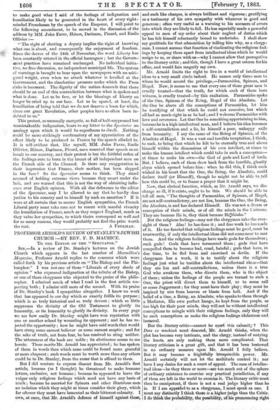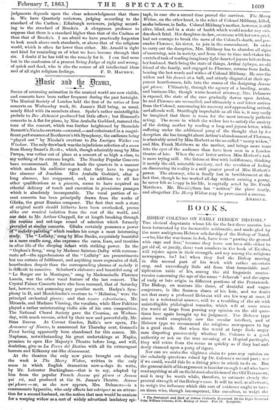PROFESSOR ARNOLD'S REVIEW OF STANLEY'S JEWISH CHURCH :—BY REV. F.
D. MAURICE.
To, TEE EDITOR OF THE " SPECTATOR."
SIR,—In a review of Dr. Stanley's lectures on the Jewish Church which appears in the last number of Macmillan's Magazine, Professor Arnold replies to the censures which were called forth by his previous article on " The Bishop and the Phi- losopher." I was not one of those " Liberals of every shade of opinion " who expressed indignation at the rebuke of the Bishop, or one of those clergymen who objected to the praise of the philo- sopher. I admired much of what I read in the first article res- pecting both ; I admire still more of the second. With its praise of Dr. Stanley's book I sympathize altogether. I know no work that has appeared in our day which so exactly fulfils its purpose ; which is so truly historical and so truly devout ; which so little suppresses the divinity of the Old Testament to glorify its humanity, or its humanity to glorify its divinity. In every page we see how easily Dr. Stanley might have won reputation with one or another school by wounding its opponent ; and he has re- jected the opportunity ; how he might have said words that would have stung some earnest believer or some earnest sceptic ; and for the sake of truth, not from fear, he has resolved to sting neither. The utterances of the book are noble ; its abstinence seems to me heroic. These merits Mr. Arnold has appreciated ; he has spoken of them in words than which none could be found more graceful or more eloquent ; such words must be worth more than any others could be to Dr. Stanley, from the name that is affixed to them.
But I did venture to express dissent from Mr. Arnold's first article, because (as I thought) he threatened to make humane letters, exclusive, not humane ; because he appeared to leave the vulgar only religious feelings which need not have any basis of truth ; because he asserted for Spinoza and other illustrious men an isolation which they might at times consider their glory, which far oftener they must have lamented as their bitterest calamity. I own, at once, that Mr. Arnold's defence of himself against these,- and such like charges, is always brilliant and vigorous ; gratifying as a testimony of his own sympathy with whatever is good and generous ; often very useful as a warning to his accusers of errors into which they are likely to fall. He has especially made a powerful appeal to men of my order about their neglect of duties which he has felt himself reluctantly bOund to undertake. I shall show my gratitude for that admonition by telling him why, as a clergy- man, I cannot assume that function of vindicating the religious feel- ings by keeping them apart from intellectual ideas which he would assign to us, or share with us—why I cannot allow that prerogative to the literary critic ; and this, though I have a great esteem for his office, and would fain magnify my own.
Mr. Arnold limits the right to live in a world of intellectual ideas to a very small circle indeed. He names only three men to whom he would accord the privilege,—Parmenides, Spinoza, and Hegel. Now, it seems to me that every one of these great men is cruelly treated—that the truth, for which each of them bore witness, is cruelly treated—by this exaltation. Parmenides spoke of the One, Spinoza of the Being, Hegel of the Absolute. Let the One be above all the conceptions of Parmenides, let him be testifying of that which he could not conceive, but which all had as much right in as he had ; and I welcome Parmenides with love and reverence. Let that One be something appertaining to him, because he is a high intellectual man, and I believe his idea becomes a self-contradiction and a lie, he himself a poor, unhappy exile from humanity. I say the same of the Being of Spinoza, of the Absolute of Hegel. It was a vast and terrible temptation, I think, to each, to bring that which he felt to be eternally true and above himself within the dimensions of his own intellect, at times to make the human intellect which could take in such a conception— at times to make his own—the God of gods and Lord of lords. But, I believe, each of them drew back from the horrible, ghastly abyss which opened before him : when he did this, I think each wished in his heart that the One, the Being, the Absolute, could declare itself (or Himself), though he might not be able to tell how this could be, or to frame a prayer that it might be.
Now, that clerical function, which, as Mr. Arnold says, we dis- charge so ill, if it exists, ought to be this. We should be able to tell all men, " The thoughts of Parmenides, of Spinoza, of Hegel, are not self-contradictory, are not lies, because the One, the Being, the Absolute, is and has declared Himself. He was not a dream or conception of their minds, or of all the minds in the Universe. They are because He is, they think because He:thinks."
But the religious feelings—may not the clergyman take the over- sight of them ? Alas! he has done it ; and fine work he has made of it. He too fancied that religious feelings must be good, must be trustworthy, if only the intellectual ideas did not come near to mar them. And the religious feelings have made gods for themselves ; such gods ! Gods that have tormented them ; gods that have compelled them to become bad, cruel, hateful ; gods that have, in due time, to be fled from and exorcised as devils. If the clergyman has a work, it is to testify about the religious feelings just what he testifies about the intellectual ideas—that they are lies and self-contradictions, unless there is a true God who awakens them, who directs them, who is tha object of them ; unless the feelings of the people are turned to such a One, the priest will divert them to himself, or to some calf or some Juggernaut ; for they must have their play; they must be inspired by airs from heaven or blasts from hell. And if the belief, of a One, a Being, an Absolute, who speaks to them through a Mediator, His own perfect Image, be kept from the people, as too high for their poor minds, they will not be without intellectual conceptions to mingle with their religious feelings, only they will be such conceptions as make the religious feelings idolatrous and immoral.
But the literary critic—cannot he spot this calamity ? This Deus ex machind must descend, Mr. Arnold thinks, when the plot has become very intricate, and the clergy, instead of untying the knots, are only making them more complicated. That literary criticism is a great gift, and that it has been bestowed in no ordinary measure upon Mr. Arnold I fully believe. But it may become a frightfully irresponsible power. Mr. Arnold certainly will not let the multitude control it ; nor have I any desire for such a court of appeal. The men of intellec- tual ideas—be they three or more—are too much out of the sphere of ordinary existence to exercise any practical jurisdiction, if any of them are left in the world to exercise it. The literary critic must then be omnipotent, if there is not a real judge higher than he is. If I am appealed to as a clergyman, I must speak as one. I must say distinctly I think these is a higher judge than the Critic. I do think the probability, the possibility, of his pronouncing right
judgments depends upon the clear acknowledgment that there is. We have Quarterly reviewers, judging according to the standard of the Carlton ; Edinburgh reviewers, judging accord- ing to the standard of Brooks's. A clergyman professes to suppose that there is a standard higher than that of the Carlton or than that of Brooks's. I am afraid we have practically forgotten to look much above such standards, or above that of the religious world, which is often far lower than either. Mr. Arnold is right and kind for reminding us of what we have become through that sin. I doubt if he has told us the remedy for it. I can find none but in the confession of a present living Judge of right and wrong, of quick and dead, who is also the source of all intellectual ideas































 Previous page
Previous page